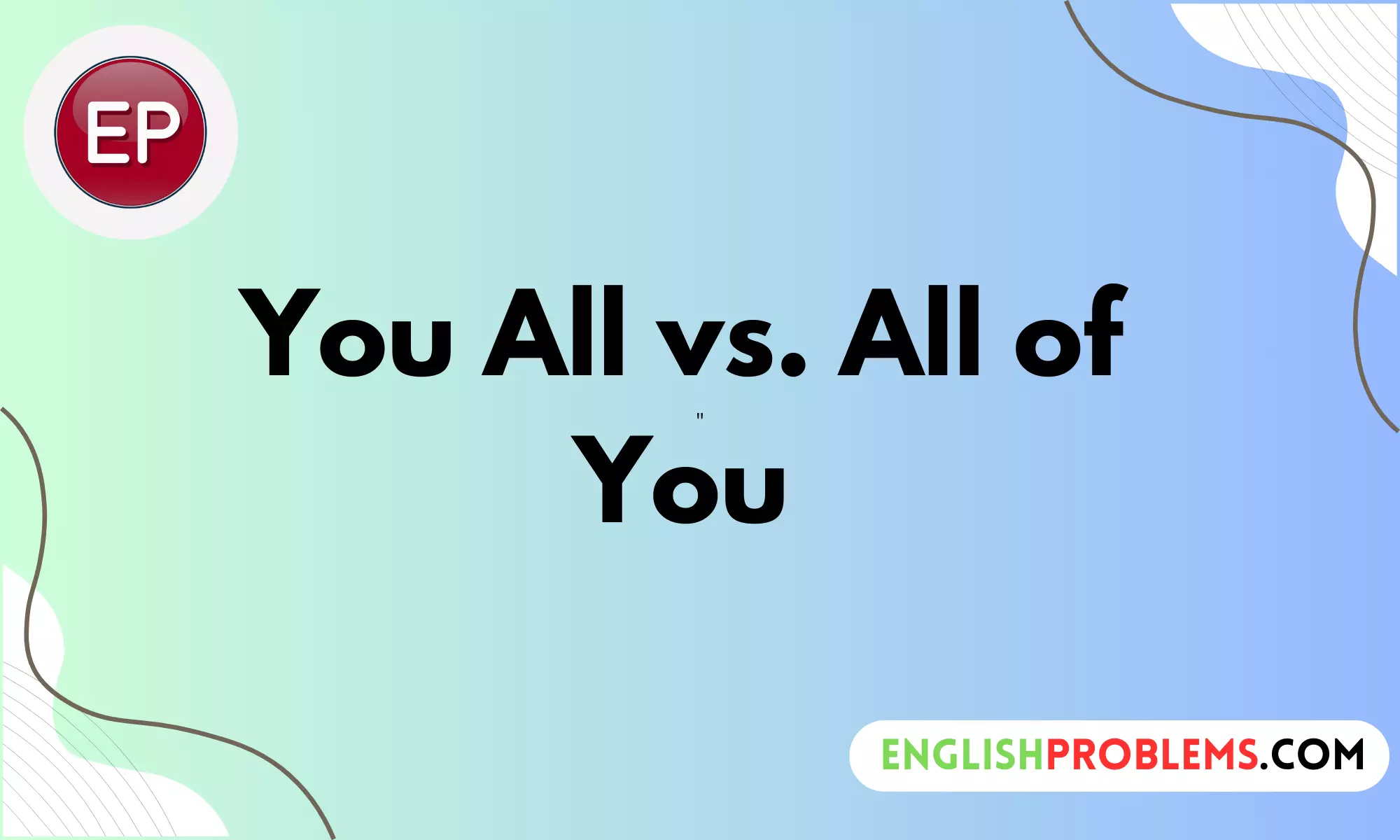Understanding the nuances between “you all” and “all of you” can seem trivial, but it has significant implications for clarity and tone in communication.
This article dives deep into these phrases, providing clear explanations, practical examples, and tips for choosing the right one based on context.
What is “You All”?
Definition and Usage
“You all” is a colloquial phrase used primarily in informal settings. It’s often employed in spoken language to address a group of people. This phrase is particularly prevalent in the Southern United States but has gained wider acceptance over time.
Examples:
- Informal Conversation: “You all are going to love this new restaurant.”
- Group Invitation: “I hope you all can make it to the party tonight.”
Origins and Regional Variations
The phrase “you all” has its roots in American English, especially in Southern dialects. It emerged as a way to address multiple people in a manner that feels more conversational. Over the years, it has become a common term in informal settings across the U.S.
Regional Insights:
- Southern US: Frequently used as a standard way to address groups.
- Other Regions: While less common, it’s understood and occasionally used in other parts of the country.
What is “All of You”?
Definition and Usage
“All of you” is a more formal phrase used to address a group in both written and spoken contexts. It fits well in professional and academic settings where clarity and formality are essential.
Examples:
- Professional Setting: “All of you need to submit your reports by Friday.”
- Academic Context: “All of you should review the material before the exam.”
Formality and Context
This phrase is often chosen for its clarity and neutrality, making it suitable for formal communication. It avoids the casual tone that “you all” might convey.
Formal vs. Informal:
- Formal: “All of you are required to attend the meeting.”
- Informal: “You all need to check out this new coffee shop.”
Comparing “You All” and “All of You”
Contextual Differences
Choosing between “you all” and “all of you” depends on the context and the tone you wish to convey.
- Formality: “All of you” is ideal for formal situations, while “you all” fits informal conversations.
- Clarity and Tone: “All of you” provides a clear, professional tone, whereas “you all” is more casual and conversational.
Practical Examples
To illustrate the difference, consider these scenarios:
- Formal Invitation: “All of you are invited to the annual conference.”
- Informal Invitation: “You all should come over for a barbecue this weekend.”
Table: When to Use Each Phrase
ContextUse “You All”Use “All of You”Formal EventLess suitableIdeal for official invitationsCasual ConversationNatural and friendlyLess common, can seem too formalProfessional SettingAvoid for clarityClear and appropriate
Common Misconceptions
Confusion in Usage
Several misconceptions about these phrases can lead to confusion:
- Misconception 1: “You all” is always informal and therefore less proper.
- Misconception 2: “All of you” is overly stiff and should be avoided in casual settings.
Clarifications
- “You All”: While it is informal, it is widely accepted in conversational English. It should be avoided in highly formal writing.
- “All of You”: Though more formal, it can be used in any setting where clarity is required, including informal ones if the context demands it.
Tips for Choosing the Right Phrase
Consider Your Audience
When selecting between “you all” and “all of you,” think about your audience.
- Formal Settings: Opt for “all of you” to maintain professionalism.
- Informal Settings: “You all” fits well in casual conversations with friends or family.
Match the Tone
Align your choice with the tone of your message:
- Professional Tone: Use “all of you” to maintain clarity and formality.
- Friendly Tone: “You all” conveys a relaxed, conversational approach.
Practical Advice
To make the right choice:
- Audience: Who are you addressing?
- Setting: Is it formal or informal?
- Tone: What tone do you want to set?
Conclusion
Understanding the difference between “you all” and “all of you” can enhance your communication, ensuring it is appropriate for the context and audience.
Summary
- “You All”: Best for informal settings and casual conversations.
- “All of You”: Ideal for formal situations and professional communication.
Call to Action
Practice using both phrases in your communication to get comfortable with their nuances. Share your examples or questions about these phrases in the comments below!
This comprehensive guide provides a clear distinction between “you all” and “all of you,” offering practical advice for using these phrases effectively in various contexts.

Lucy Wright combines her academic background with a flair for simplifying the intricate details of grammar. Her practical advice and clear explanations empower readers to improve their writing skills and grasp challenging concepts effortlessly.










